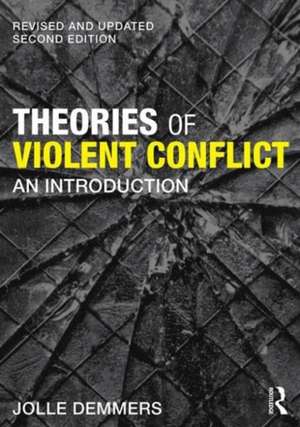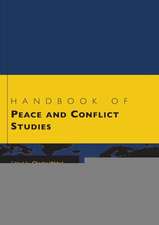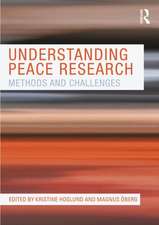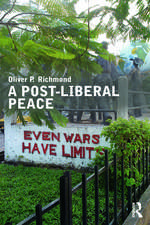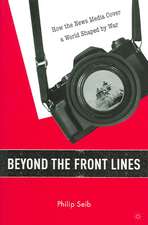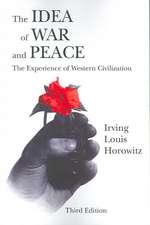Theories of Violent Conflict: An Introduction
Autor Jolle Demmersen Limba Engleză Paperback – 8 aug 2016
Theories of Violent Conflict takes the centrality of the ‘group’ as an actor in contemporary conflict as a point of departure, leaving us with three main questions:
• What makes a group?
• Why and how does a group resort to violence?
• Why and how do or don’t they stop?
The book examines and compares the ways by which these questions are addressed from a number of perspectives: primordialism/constructivism, social identity theory, critical political economy, human needs theory, relative deprivation theory, collective action theory and rational choice theory. The final chapter aims to synthesize structure and agency-based theories by proposing a critical discourse analysis of violent conflict.
With new material on violence, religion, extremism and military urbanism, this book will be essential reading for students of war and conflict studies, peace studies, conflict analysis and conflict resolution, and ethnic conflict, as well as security studies and IR in general.
| Toate formatele și edițiile | Preț | Express |
|---|---|---|
| Paperback (1) | 309.99 lei 22-36 zile | +17.47 lei 6-12 zile |
| Taylor & Francis – 8 aug 2016 | 309.99 lei 22-36 zile | +17.47 lei 6-12 zile |
| Hardback (1) | 931.61 lei 43-57 zile | |
| Taylor & Francis – 10 aug 2016 | 931.61 lei 43-57 zile |
Preț: 309.99 lei
Nou
Puncte Express: 465
Preț estimativ în valută:
59.34€ • 64.47$ • 49.87£
59.34€ • 64.47$ • 49.87£
Carte disponibilă
Livrare economică 31 martie-14 aprilie
Livrare express 15-21 martie pentru 27.46 lei
Preluare comenzi: 021 569.72.76
Specificații
ISBN-13: 9781138856400
ISBN-10: 1138856401
Pagini: 176
Ilustrații: 5
Dimensiuni: 174 x 246 x 16 mm
Greutate: 0.32 kg
Ediția:Revised
Editura: Taylor & Francis
Colecția Routledge
Locul publicării:Oxford, United Kingdom
ISBN-10: 1138856401
Pagini: 176
Ilustrații: 5
Dimensiuni: 174 x 246 x 16 mm
Greutate: 0.32 kg
Ediția:Revised
Editura: Taylor & Francis
Colecția Routledge
Locul publicării:Oxford, United Kingdom
Public țintă
Postgraduate, Professional, and UndergraduateCuprins
Introduction: conflict analysis in context
1. Identity, boundaries and violence
2. On love and hate: social identity approaches to inter-group violence
3. Violence and structures
4. Mobilization for collective violent action: multi-causal approaches
5. Rational choice theory: the costs and benefits of war
6. Telling each other apart: a discursive approach to violent conflict
Conclusions
1. Identity, boundaries and violence
2. On love and hate: social identity approaches to inter-group violence
3. Violence and structures
4. Mobilization for collective violent action: multi-causal approaches
5. Rational choice theory: the costs and benefits of war
6. Telling each other apart: a discursive approach to violent conflict
Conclusions
Notă biografică
Jolle Demmers is Associate Professor and Co-Founder of the Centre for Conflict Studies, Utrecht University, the Netherlands.
Recenzii
'This book is a masterly effort to navigate us through the multiple ways of thinking about armed conflicts and violence. Amongst its many achievements, are precisely the one which urges us to recognize the implicit assumptions we bring to bear when analyzing these dark aspects of our human communities and how we might build better conversations between theories of conflict in order to re-invigorate our thinking and practice of violence reduction and peace building.' -- Jenny Pearce, University of Bradford, UK
'Demmers brings unique explanatory powers to theories of violence; capturing and interrogating their development, meanings and applications in a conflicted global environment. Cogent, comprehensive and compelling, this is a book for our times.' -- Judith Large, University of Kent, UK
'This updated Demmers text provides a very helpful and accessible framework for understanding the variety, subtlety and breadth of theories of violent conflict and their interconnectedness. This version captures emerging theories and provides updated case studies for a fresh perspective.' -- Gloria Rhodes, Emory University, USA
'Demmers makes a topic that many students struggle with (theory) accessible through clear and concise writing and the use of the Hollis matrix to identify the philosophical assumptions that distinguish theories from each other.' -- Maia Carter Hallward, Kennesaw University, USA
Praise for the first edition:
'Theories of Violent Conflict is a delight to read. It has a depth and intellectual passion that students will find very attractive. It is both approachable and straightforward, and yet penetrating and theoretically rich.' -- Hugh Miall, University of Kent, UK
'Jolle Demmers has produced a timely, comprehensive and richly interwoven account of the main theories underpinning our understanding of conflict and chronic insecurity. Lucidly written and explained, from identity through culture and global governance, to rational choice and discourse analysis, Demmers effortlessly brings order and insight to an otherwise fragmented field. Widely referenced and clearly structured, Theories of Violent Conflict is an essential and authoritative guide for students, academics and concerned public alike. -- Mark Duffield, University of Bristol, UK
'Theories of Violent Conflict is a book of remarkable scope that will prove invaluable to academia, government and policy circles, and practitioners of conflict resolution and peacebuilding….Demmers deftly and insightfully guides the reader through a rigorous journey of comparative analysis, elucidating the theoretical underpinnings and practical implications of the major approaches that seek to explain contemporary world conflicts.' -- Jerry W. Sanders, University of California, Berkeley, USA
'Demmers brings unique explanatory powers to theories of violence; capturing and interrogating their development, meanings and applications in a conflicted global environment. Cogent, comprehensive and compelling, this is a book for our times.' -- Judith Large, University of Kent, UK
'This updated Demmers text provides a very helpful and accessible framework for understanding the variety, subtlety and breadth of theories of violent conflict and their interconnectedness. This version captures emerging theories and provides updated case studies for a fresh perspective.' -- Gloria Rhodes, Emory University, USA
'Demmers makes a topic that many students struggle with (theory) accessible through clear and concise writing and the use of the Hollis matrix to identify the philosophical assumptions that distinguish theories from each other.' -- Maia Carter Hallward, Kennesaw University, USA
Praise for the first edition:
'Theories of Violent Conflict is a delight to read. It has a depth and intellectual passion that students will find very attractive. It is both approachable and straightforward, and yet penetrating and theoretically rich.' -- Hugh Miall, University of Kent, UK
'Jolle Demmers has produced a timely, comprehensive and richly interwoven account of the main theories underpinning our understanding of conflict and chronic insecurity. Lucidly written and explained, from identity through culture and global governance, to rational choice and discourse analysis, Demmers effortlessly brings order and insight to an otherwise fragmented field. Widely referenced and clearly structured, Theories of Violent Conflict is an essential and authoritative guide for students, academics and concerned public alike. -- Mark Duffield, University of Bristol, UK
'Theories of Violent Conflict is a book of remarkable scope that will prove invaluable to academia, government and policy circles, and practitioners of conflict resolution and peacebuilding….Demmers deftly and insightfully guides the reader through a rigorous journey of comparative analysis, elucidating the theoretical underpinnings and practical implications of the major approaches that seek to explain contemporary world conflicts.' -- Jerry W. Sanders, University of California, Berkeley, USA
Descriere
This textbook introduces students of violent conflict to a variety of prominent theoretical approaches, and examines the ontological stances and epistemological traditions underlying these approaches. This 2nd editon has been fully revised and updated throughout.
